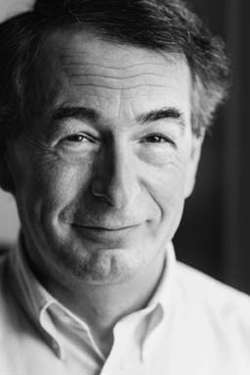
Your complimentary articles
You’ve read one of your four complimentary articles for this month.
You can read four articles free per month. To have complete access to the thousands of philosophy articles on this site, please
Interview
Anthony Gottlieb
Grant Bartley interviews the historian of Western philosophy and former Economist editor.
Hello Anthony. I found your new book The Dream of Enlightenment: The Rise of Modern Philosophy to be an enjoyable and informative introduction to Enlightenment philosophy. Can you please tell us a little about its aims, the period it covers, and what motivated you to write it?

It’s the second installment of a chronological history of Western philosophy. The first ran from ancient philosophy to the Renaissance, and this new volume covers philosophers from René Descartes and Thomas Hobbes in the Seventeenth Century to just before Immanuel Kant, whose main work was published in the late Eighteenth Century. A third volume will run from Kant to the present day. The overall aim of the project is to engage readers with some of the main ideas and arguments of Western philosophy in a way that requires no prior acquaintance with it. I began this enterprise when I was science editor of The Economist. My hope was to do for philosophy what we tried to do in the magazine for science – that is, to explain it in a way that was accessible, yet also rigorously accurate.
What criteria did you use to choose which philosophers you would discuss?
To some extent the agenda was set by tradition, because I wanted to provide a deeper understanding of ideas that were already in wide circulation. Many people have heard a bit about Descartes and Hobbes, for example. My aim is to tell them more about the classic works they’ll see alluded to in works of history or popular science. But I’ve also introduced some less familiar figures, whose work either played a significant role in the development of philosophy or is of particular interest to me – histories of philosophy are always idiosyncratic to some degree. Thus in the new book I have a short chapter on Pierre Bayle, who was widely read in the early Eighteenth Century – and rightly so, in my opinion – but is almost forgotten now, even by specialists in the period. On the other hand, because I’m not writing primarily for academics, I’ve felt free to give much less than the usual amount of space to Bishop George Berkeley, who for various reasons still looms large in university courses, but is rather an oddball, even by the standards of philosophy.
Do they have anything in common?
One thing the main characters in The Dream of Enlightenment have in common is a desire to supplant traditional ideas inherited from ancient and medieval thinkers and to explore the implications of Galileo’s ‘new philosophy’, as they called it – we call it the ‘Scientific Revolution’. One outlier who doesn’t quite fit this pattern is Gottfried Leibniz, who aimed to find compromises between the old and the new, even while he himself played a big role in advancing the new.
Which thinker’s philosophy do you particularly agree with or relate to?
I usually found much to appreciate in the perspectives and achievements of each one of my subjects, even though there was plenty of passionate disagreement between them. Like many of today’s professional philosophers, though, I am particularly keen on David Hume. If I had to pick a favourite, it would be him. This is largely because I share not only many of his attitudes – his naturalism and agnosticism, for instance – but also many of his philosophical interests – in the limits of scepticism, and in the nature of causation and probabilistic reasoning, for example.
Which of these men do you particularly admire as a human being?
Bertrand Russell famously wrote that Baruch Spinoza was “the noblest and most lovable of the great philosophers.” I fell under Spinoza’s spell, too, as many do. There’s the humble simplicity, selflessness and dedication of his life; the brave originality of his take on religion, which he thought had led many astray and done such harm; and the apparent absence in his character of malice, self-regard, or any of the destructive passions. I also admire Hume for his genial, affectionate nature, his even temperament, and his preference for gentle persuasion rather than confrontation and bludgeoning.
Do you perceive a trajectory in thought as the Enlightenment progresses?
The radical and most creative work done in the span covered by my book came early on, with Descartes, Hobbes and Spinoza, in the first three-quarters of the Seventeenth Century. This is the period of the so-called ‘pre-Enlightenment’ or ‘early Enlightenment’. I think that a lot of what came afterwards, in the Eighteenth Century, was a matter of digesting, assimilating, and coming to terms with these early ideas.
What do these thinkers have to say to us today?
If one were to try and identify the core values of the thinkers in my book, some of the things that spring to mind are the questioning of intellectual authority – and particularly the dictates of religious establishments – and a keen sense of the weakness of the human mind. I’d say that these values are needed as much today as they have ever been.
What did you personally learn when writing this book?
I came to have a much greater appreciation of Thomas Hobbes, whose work is more wide-ranging than popular accounts suggest, and more sympathy for Leibniz, who I think was rather traduced in Bertrand Russell’s influential History of Western Philosophy. One general lesson I hope I learned is a keener appreciation of the importance of context when interpreting the thought of early-modern philosophers.
• Grant Bartley is an editor for Philosophy Now.









